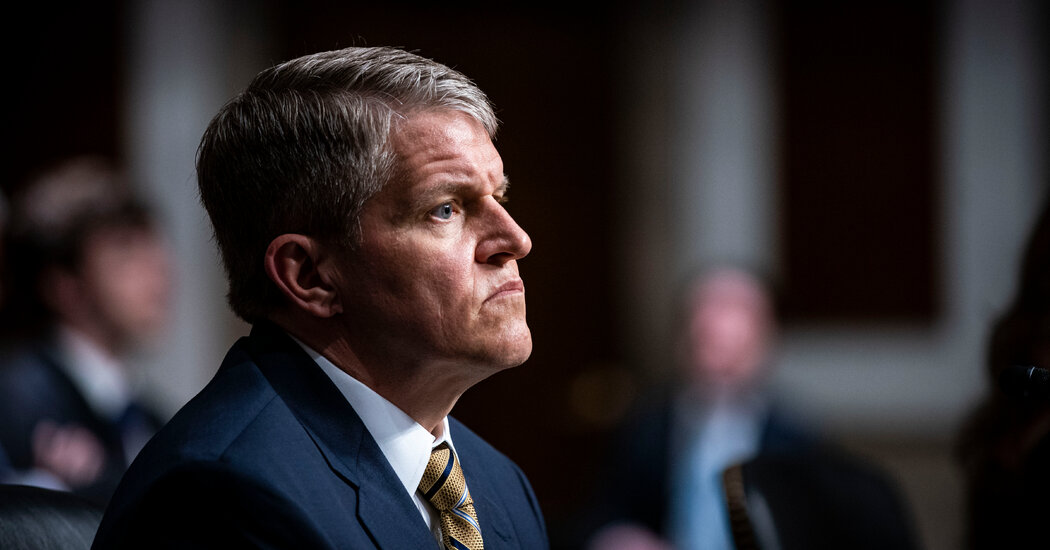The Biden administration will withdraw on Thursday the nomination of David Chipman, a former federal agent who had promised to crack down on the us
The Biden administration will withdraw on Thursday the nomination of David Chipman, a former federal agent who had promised to crack down on the use of semiautomatic weapons and high-capacity gun magazines, to head the Bureau of Alcohol, Tobacco, Firearms and Explosives, according to five people with knowledge of the situation.
The withdrawal of Mr. Chipman represents a major setback in President Biden’s plan to reduce gun violence in the wake of several mass shootings earlier this year, and comes after his push to expand background checks on gun purchases stalled in Congress in the face of unified Republican opposition.
The selection of Mr. Chipman, a longtime A.T.F. official who served as a consultant to the gun safety group founded by former Representative Gabrielle Giffords, provoked a powerful backlash from the National Rifle Association and other pro-gun organizations who cast his confirmation as a threat to their Second Amendment rights.
Mr. Biden, who nominated Mr. Chipman after receiving pressure from Ms. Giffords and other gun control proponents, needed the support of all 50 senators who caucus with the Democrats and the tiebreaking vote of Vice President Kamala Harris to get Mr. Chipman confirmed.
In recent weeks, Senator Angus King, a Maine independent who caucuses with Democrats, told leadership and Biden administration officials that he could not support Mr. Chipman, citing Mr. Chipman’s blunt public statements about gun owners in the past, people familiar with the situation said.
During his contentious confirmation hearing in May, Republicans on the Senate Judiciary Committee seized on Mr. Chipman’s scathing comments — including an interview in which he likened the buying of weapons during the pandemic to a zombie apocalypse.
Senator Joe Manchin III, Democrat of West Virginia who had originally suggested he was open to the pick, eventually soured on Mr. Chipman’s selection too.
His nomination deadlocked in the committee, but was reported to the Senate for a floor vote through a parliamentary maneuver. It never got one.
It is the second high-profile nomination of Mr. Biden’s to be withdrawn for lack of Democratic support. In March, Neera Tanden, his pick to head the budget office, pulled out of contention following an uproar over her caustic public statements. She was later hired as a policy adviser in the West Wing.
As the hopes for Mr. Chipman’s confirmation waned this summer, White House officials began discussing the possibility of bringing him into the administration as an adviser, but no decisions have been made about his future. The administration has no immediate plans to appoint a new nominee, according to a person involved in the process who requested anonymity because they were not authorized to speak about the matter publicly.
As recently as last month, the White House signaled it was standing by its nominee, touting Mr. Chipman’s 25 years of experience as an A.T.F. agent, but also acknowledging the uphill battle he faced to gain confirmation. White House officials pinned the blame solely on Republican lawmakers, ignoring the opposition from members of the Democratic caucus.
“We are disappointed by the fact that many Republicans are moving in lock step to try to hold up his nomination and handcuff the chief federal law enforcement agency tasked with fighting gun crimes,” Jen Psaki, the White House press secretary, said in August. “It speaks volumes to their complete refusal to tackle the spike in crime we’ve seen over the last 18 months.”
The withdrawal was first reported by The Washington Post.
In the 48 years since its mission shifted primarily to firearms enforcement, the A.T.F. has been weakened by relentless assaults from the N.R.A. which critics have argued made it an agency engineered to fail.
Fifteen years ago, the N.R.A. successfully lobbied to make the director’s appointment subject to Senate confirmation — and has subsequently helped block all but one nominee from taking office.
And at the N.R.A.’s behest, Congress has limited the bureau’s budget; imposed crippling restrictions on the collection and use of gun-ownership data, including a ban on requiring basic inventories of weapons from gun dealers; and limited unannounced inspections of gun dealers.
Annie Karni contributed reporting.
www.nytimes.com
